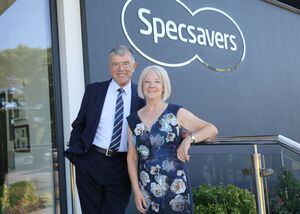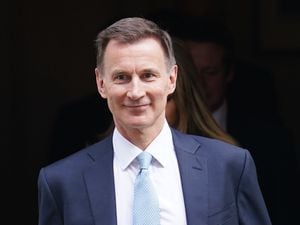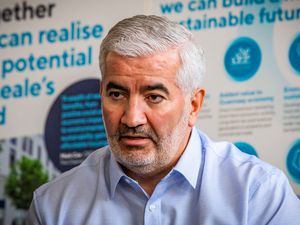‘There are challenges but we’re committed to Guernsey'
WHEN you meet Doug and Dame Mary Perkins, you are struck by their modesty and friendly, down-to-earth attitude, as well as their love for Guernsey.

Sitting in Specsavers’ support office, off La Villiaze Road in St Andrew’s, which has recently seen a multimillion-pound refurbishment, their business acumen is also clear to see and came to the fore during our extended interview – both in terms of Specsavers and the island’s future.
Brexit
Inevitably, Brexit crops up during conversation. Mr Perkins stressed that the next few months would be critical.
‘I don’t think any sector in Guernsey is keen on a “no deal”. Everybody is trying to prepare for it. But it’s not always obvious how to prepare for it,’ he said.
‘With a transition deal, you’ll get a couple of years to accommodate for that, so it has to be, by definition, good for business – whereas I have talked to loads of business people who would have to do enormous things to cope with a hard exit.
‘Specsavers is not in the enormous category, but we are in the significant category, and not knowing exactly what it is that we have to do means we will have to watch every single move. We have a team of specialists that are looking at all those variations on a weekly basis. It’s all taking time and, whatever happens, it’s going to be hugely costly, as it would be for the financial services industry.
‘It’s one of those disruptive changes that we definitely wouldn’t want but we will get through the outcome, whatever the outcome is.’
Dame Mary was more sanguine about its impact. While the uncertainty was a potentially costly issue for business, she expressed confidence that the UK would get through the ‘huge shock’ of Brexit.
‘Obviously one picks up what is going on from the media, and they have a tendency to speculate on all the bad things that are going to happen,’ she said. ‘But I think in the end we will surprise ourselves about how it settles down.
‘There will be odd things that you will have a battle over, no doubt. Then there will be some companies that will have to spend a lot of money doing whatever they have to do. But in the end I think it is going to balance out and I don’t think the world will come to a stop.’
Dame Mary added: ‘We can’t control it. It’s time to put our thinking caps on, have a good think and move forward and do what we can. Otherwise it becomes very miserable. But certainly by next March we are going to know anyway.’
Disruptive challenges facing Guernsey
The island is still an attractive place to set up a business but there are challenges, added Mr Perkins, who is joint group CEO with their son John.
‘From time to time there are disruptive changes, as there were after the war, and in the ’60s when the horticultural industry was in transition. And now, again, these are forces that you can’t do anything about. They are about technology changes, political changes, economic changes. People’s retail habits are also changing. So you have to take that all into account.
‘It’s very easy to think: “Ah well, it’s all the fault of government”. I do not believe that is the case. So you have got to separate these external factors. It doesn’t matter what government is in, every country is having to face these changes.
‘There are things we can control. We can generally label those into infrastructure, travel and education comes into that category.
‘We are in transition at the moment on those issues. Lots of reviews are taking place and we hope that they will come to the right decision because it’s not always easy to balance the needs of business with the needs of the domestic market that live here every day – particularly with travel.’
The cost of living and attracting talent to Guernsey
Mr Perkins stressed that he couldn’t speak too highly of the States of Guernsey’s population control department in terms of supporting Specsavers’ requirements – but warned that the cost of living was a challenge for Guernsey PLC.
‘I think adverse changes affect everyday people, particularly people coming into the island, including Guernsey returners. It is much more difficult to settle. Back in the ’80s, people might leave for five or 10 years, then they’d come back and settle down. It was kind of paradise for people, Guernsey and incomers. You couldn’t go wrong.
‘Ten years ago London was definitely a lot more expensive than Guernsey, but now there are all sorts of new cost barriers. You can enjoy a lower cost of living and lower housing costs in the UK.’
Schools
Regarding the overhaul of education in Guernsey, Dame Mary said: ‘There are people who would consider not coming here if their child is unable to get into one of the private schools.’
Teachers were also ‘uneasy’, she said, with some looking to leave the profession.
Mr Perkins expressed hope that the change would ultimately prove successful – but stressed more clarity was needed amid the current ‘instability’.
Air links
Another well-versed challenge facing the island is that of air links, but Dame Mary suggested local operators were ‘between a rock and a hard place’ because it was so expensive to run a small airline.
The present air schedules are fine for a business such as Specsavers, combined with the use of video conferencing and other communications technology. It is much more efficient than the early days of Specsavers.
‘Specsavers books an incredible number of seats in a year, but what surprises a lot of people is that we pay top dollar for seats – we don’t get a penny discount. We’re not grumbling because of that,’ said Mr Perkins.
‘But for a start-up company, you would only need to book a few flights and that could take your profitability out. Again, compared with years ago, the costs are quite significant, especially compared with Jersey.’
Referring to state-owned airline Aurigny, he said: ‘I’m not going to say it’s a solution but 100% of our business is partnership. Whether it’s in New Zealand or Finland, we are in partnership with people. We have more than 2,500 partners.
‘I just wonder whether you can get a partnership that would actually be on a bigger scale but give the legal guarantees that the important London slots would be protected. I’m not saying that can be done, but have they looked hard enough at that because are we going to go on with a small scale airline?
‘We are already subsidising Aurigny. What I am hearing now is why not subsidise another £10m? Before you know it we’ll be up to £20m. subsidy. We have to look at all options. If we have looked at all options, that is absolutely fair enough.’
Meeting challenges for Guernsey
A year ago Mr Perkins publicly raised his concerns over key issues facing the future of the island, such as education. Asked for his thoughts 12 months later, Mr Perkins said it was a ‘work in progress’.
‘In general, we have still got the same challenges attracting families and skilled senior colleagues, which we desperately need.
‘But I can’t speak too positively of the Home department within their capability. They can’t control all those issues, but they are doing their very best to get the right people to the island and long may that continue.’
Committed to Guernsey
When it comes to Guernsey, the founders of Specsavers are passionate about the island and proud that they set up their business here.
Specsavers remains very much a family business – with the couple’s three children playing a key part in running it.
Meanwhile, the company remains committed to the island. Alongside hundreds of jobs, training and career opportunities, the head office retains key functions – which includes design, marketing and finance – in support of sister offices and manufacturing plants in the UK, Europe and the Far East.
‘It speaks for itself that we are still here. We have offices in different parts of the world that we could have gone to and we’ve not,’ said Dame Mary.
Paying tribute to 500-plus staff in Guernsey, she said: ‘They share our passion. Maybe it’s because we’re here with them every day. But it makes it a pleasure to come to work.’
‘No interest’ in selling Specsavers
Asked if they would ever float Specsavers, Mr Perkins said: ‘No. People have asked us that since the ’80s, since Thatcher’s time. It was almost mandatory in Margaret Thatcher’s time to float a company. It has never been of interest to us. That really would be a total pain to us because our passion is with customers and with our joint venture partners [who co-own Specsavers stores].
‘Compared with any other jurisdiction, Guernsey has a tremendous track record of offering a consistent business environment. As long as the environment here is maintained as it has during the last 60 years, it will always suit our values. I do believe that the values of Guernsey and the values of Specsavers are very much aligned.’
The outlook for Specsavers
When it comes to the future for Specsavers, it’s all about continually improving the service. And it seems that ambition has succeeded, with Mr Perkins highlighting how 2018 has proved to be one of Specsavers’ ‘significant growth years’.
The firm is the biggest supplier of contact lenses in the UK, delivering some 500m. lenses a year, and has won a strategic alliance with supermarket Sainsbury’s.
‘Lots of stores were running out of space and the Sainsbury’s sites are in quite strategic locations out of town. That is a very good addition for people who basically go to the supermarket, do all their shopping and don’t go into towns so much these days. So it was a great fit,’ said Mr Perkins.
‘Our focus is about adding as much service to stores as possible. I think we have got the product range in good order. Obviously some of that may be challenged by Brexit. We have got technology playing a great part in frame selection, with Frame Styler helping customers to choose the right specs for them. That has been a big, big success.’
A lot of Mr Perkins’ time is now spent on developing professional services and enhancing eye health by closing the gap between eye surgery and links with the NHS, including GPs.
‘Specsavers has always maintained strong links with the NHS. But with audiology and with eye health, we’re actually supporting the health service in a much more comprehensive way and enhancing our service offer, which makes us more resistant to online trading competitors.
‘Obviously online trading is something we also do ourselves – people are able to choose glasses and make appointments online – and we have big data and marketing initiatives and that’s going well. So there’s a lot of exciting things happening online, but there is always disruptive change, so we are always looking to improve our service delivery.
‘The service developments have also meant some warehousing changes in Guernsey, which may see some existing posts become redundant due to a change in how glasses are displayed instore.’
Specsavers is ‘more than holding our own’ competitively, said Mr Perkins.
‘We are very lucky in the UK and the Republic of Ireland to have close to 50% market share by volume, which any retailer would be very, very grateful for in the current economic climate. We are extremely grateful for the continued support of our customers.’





